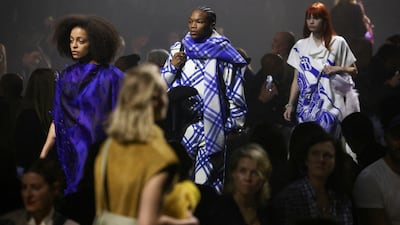British luxury goods maker Burberry has sacked its chief executive and promised a "more familiar" look, as it tries to revive its flagging fortunes amid a failed attempt to woo more luxury spenders.
Jonathan Akeroyd, who had been in the job for two years, will be replaced by former Coach boss Joshua Schulman, the company announced on Monday.
Burberry also warned on its profit and scrapped its dividend, which sent the company's shares down more than 17 per cent on the London Stock Exchange to levels they have not touched in a decade.
"The level of the group’s appeal has been thwarted by weakening consumer demand, especially in the likes of China, with sales in the Asia-Pacific region declining by 23 per cent in the first quarter," said Richard Hunter, head of markets at Interactive Investor.
The 168-year-old brand has had a worse time of it than many of its competitors in recent years, mainly because consumers have been unimpressed by a shift in style that was supposed to propel sales beyond their mainstay trench coats and accessories.
Mr Schulman, who has been at the helm of both Michael Kors and Coach in recent years, will be Burberry's fourth chief executive in 10 years.

Burberry, best known for its classic camel, red and black check print, has had almost the same amount of turnover of designers during the same period. Two years ago Daniel Lee replaced Riccardo Tisci, who had left after fewer than five years.
The group's chairman Gerry Murphy said Mr Schulman would dismiss Burberry's recent attempts at taking the brand into a higher bracket of luxury.
"The appointment of Josh does not signal a repositioning of Burberry's ambition," he said.
"It's very much about a nudge of the tiller and adjustment rather than a fundamental change of strategy."
However, some analysts said it would take more than a "nudge of the tiller" to turn Burberry's fortunes around.
"Investors were becoming increasingly frustrated with the performance at Burberry and looking for a change in strategic direction. We expect that this will start as a gentle turn but will evolve into a larger shift over time," Deutsche Bank analysts said in a research note.
Others, such as Dan Coatsworth, investment analyst at AJ Bell wondered "whether Burberry is going to get back on track on its own, or whether an opportunistic bidder is going to appear while the business is on its knees and take it over".
“It ticks all the right boxes for someone to make a bid – depressed share price, new chief executive who hasn’t had time to enact a recovery plan and disgruntled shareholders who might welcome a generous bid premium to make up for recent losses.”

The higher ground
Several luxury brands have attempted to make for the higher ground in the luxury sector in recent years, given that the sales at the top end are seemingly impervious to rising inflation, interest rates and economic downturns.
"It’s super tough for luxury brands reliant on aspirational shoppers," said Susannah Streeter, head of money and markets at Hargreaves Lansdown.
"They aren’t as insulated as the super-rich from the pressures whipped up in an era of high interest rates and an uncertain economic climate.
"While Burberry’s brand repositioning has come a long way, it’s not yet sharp enough to reach the heart of the more resilient end of the luxury market."
Burberry's fragile position is illustrated by the price-top-earnings ratio on the company's shares. At 16 times forward earnings for the next year, it trails behind the average for global luxury shares of 22.
Indeed, the world's biggest watchmaker, Swatch, reported a steep drop in first half sales and earnings on Monday.
Burberry has the luxury sector's weakest PE ratio, which is widely used in financial markets to gauge the relative value of stocks.
It stands at 16 times forward earnings over the next 12 months compared with 22 for other global luxury stocks.
Nonetheless, Burberry's woes shares in some of its European contemporaries, with shares in luxury groups Hermes and LVMH both losing about 1 per cent in trading on Monday.


